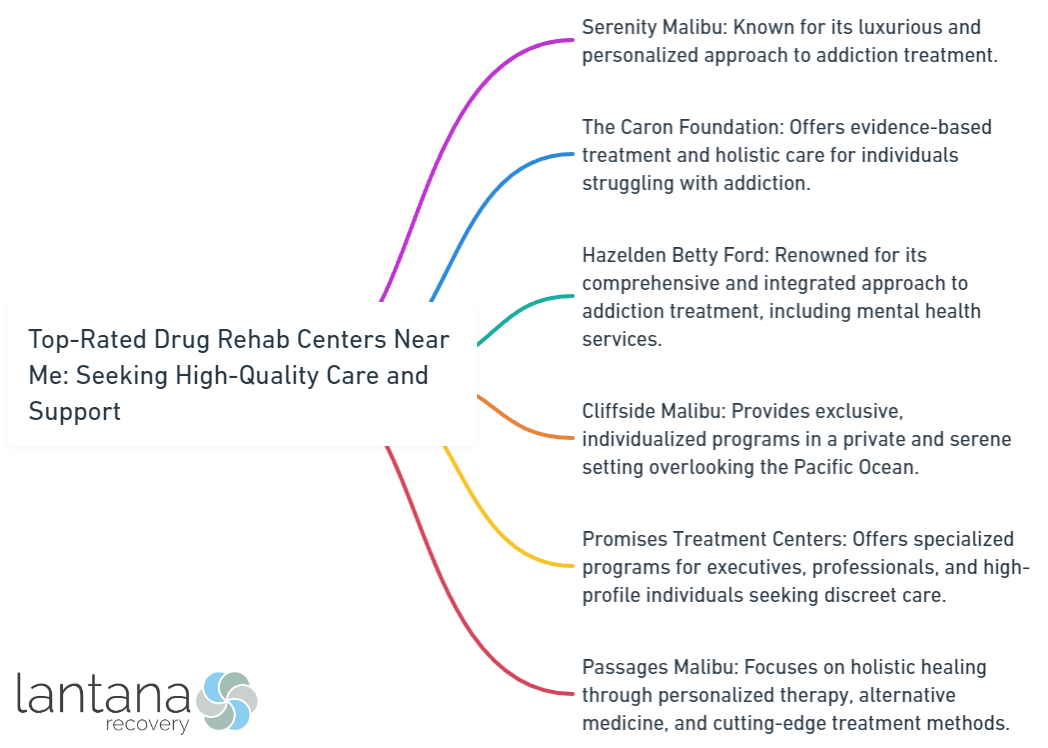Drug addiction is a complex and challenging issue that affects millions of individuals worldwide. When it comes to seeking treatment, finding a top-rated drug rehab center is of utmost importance. These centers provide high-quality care, support, and evidence-based treatments to help individuals overcome addiction and achieve long-term recovery. Understanding the nature of drug addiction and the need for professional treatment is crucial in recognizing the significance of seeking care from reputable rehab centers.
Drug addiction is caused by various factors, including genetic predisposition, environmental influences, and psychological factors. Professional treatment is necessary because addiction is a chronic disease that requires specialized care. Top-rated drug rehab centers offer comprehensive treatment programs that address the physical, psychological, and emotional aspects of addiction.
When searching for a drug rehab center, it is essential to consider several factors. These include the location and accessibility of the facility, its accreditation and licensing, the treatment approaches and therapies offered, and the qualifications and expertise of the staff. Researching and evaluating top-rated drug rehab centers is vital to ensure that individuals receive the best care possible.
Key services offered by these rehab centers include medical detoxification, which helps manage withdrawal symptoms and ensures a safe and comfortable detox process. Individualized treatment plans are also developed to meet the unique needs of each individual, incorporating a combination of evidence-based therapies and interventions. Aftercare and relapse prevention programs are essential components of treatment, as they provide ongoing support and help individuals maintain their sobriety in the long term.
Understanding the cost of treatment and insurance coverage is also crucial. The cost of treatment can vary depending on factors such as the type of program and the duration of stay. Many top-rated drug rehab centers accept insurance coverage and offer payment options to make treatment more accessible to individuals seeking help.

Understanding Drug Addiction and the Need for Treatment
Understanding drug addiction and the need for treatment is crucial. Drug addiction, which is a chronic brain disease, can affect people from all walks of life. It is characterized by compulsive drug-seeking behavior and the inability to control drug use despite negative consequences.
Treatment for drug addiction is vital because it helps individuals regain control of their lives and improve overall well-being. Here are some important facts to consider:
- Drug addiction requires professional help and is not a moral failure or lack of willpower.
- Effective treatment addresses both the physical and psychological aspects of addiction.
- Treatment options include behavioral therapies, medication-assisted treatment, and support groups.
- The duration of treatment varies based on individual needs, but longer durations have better outcomes.
- Recovery is a lifelong process that requires ongoing support and commitment.
It’s important to understand that seeking treatment for drug addiction is a courageous step. It is not a sign of weakness, but rather a sign of strength and determination to live a healthier and more fulfilling life.
John, a 32-year-old father of two, struggled with drug addiction for years. His addiction affected his relationships, career, and well-being. Realizing the need for change, John decided to seek treatment.
With the support of his family and dedicated healthcare professionals, John underwent a personalized treatment plan that included counseling, medication-assisted treatment, and follow-up care.
Over time, John learned coping mechanisms and developed strategies to resist cravings. He rebuilt relationships, obtained stable employment, and regained self-worth. Today, John lives a fulfilling life free from addiction and continues to inspire others on their journey to recovery.
What Causes Drug Addiction?
Drug addiction is caused by a combination of factors. Genetics play a significant role, accounting for about 40-60% of a person’s vulnerability to addiction. Additionally, the environment, including exposure to drugs, peer influence, family dynamics, and traumatic experiences, also contribute to the development of addiction. Underlying mental health conditions such as depression, anxiety, or ADHD can make individuals more susceptible to addiction as well. Societal norms, cultural beliefs, and social pressures also have an influence on drug addiction. Prolonged drug use can lead to physical dependence, making it difficult to quit and increasing the risk of addiction. It is crucial to understand these causes in order to develop effective prevention and treatment strategies. By addressing these factors, individuals can receive the necessary support to overcome addiction and lead healthier lives. It’s important to remember that addiction is a complex issue with no single cause. If you or someone you know is struggling, seeking professional help and support can greatly increase the chances of recovery.
Why is Professional Treatment Necessary?
Professional treatment is necessary for effective drug addiction recovery for several reasons. Firstly, it provides access to specialized medical and psychological expertise. Instead of attempting to overcome addiction alone, individuals can benefit from the guidance and support of trained professionals who understand the intricacies of addiction.
Secondly, professional treatment facilities offer evidence-based treatment approaches and therapies that have been scientifically proven to be effective in helping individuals overcome addiction and maintain long-term sobriety. By receiving professional treatment, individuals can have confidence in the most up-to-date and effective strategies for recovery.
Thirdly, professional treatment provides a structured and supportive environment. In a treatment center, individuals are surrounded by peers who are also on the recovery journey. This sense of community and understanding can be incredibly valuable in maintaining motivation and accountability. Additionally, treatment centers often provide aftercare and relapse prevention services, further enhancing the chances of successful recovery.
Lasty, professional treatment offers a safe and controlled setting for detoxification. Detoxification can be risky and uncomfortable, especially for individuals with severe addiction. In a professional treatment setting, individuals receive medical supervision and support to ensure their safety and minimize withdrawal symptoms.
Overall, professional treatment is necessary because it provides specialized expertise, evidence-based approaches, a supportive community, and a safe detoxification environment.

Factors to Consider When Searching for a Drug Rehab Center
When it comes to finding the right drug rehab center, there are several key factors that can make a world of difference. From location and accessibility to accreditation and licensing, each aspect plays a crucial role in determining the quality of care and support provided. In this section, we’ll dive into the various factors you need to consider when searching for a drug rehab center, including the treatment approaches and therapies offered, as well as the qualifications and expertise of the staff. Let’s embark on this journey of finding the best path to recovery.
Location and Accessibility
Location and accessibility play a crucial role when selecting a top-rated drug rehab center. Opting for a conveniently located center enables easy visitation and support from family members during the treatment process. Here are some key considerations to keep in mind:
1. Proximity: It is advisable to choose a rehab center that is near your residence or easily accessible to you and your loved ones. This proximity will make visiting the center more convenient for everyone involved.
2. Transportation: Look for rehab centers that offer transportation services or are located near public transportation routes. This ensures reliable transportation for therapy sessions, making it easier to attend and stay committed to the treatment.
3. Surroundings: Selecting a center situated in peaceful and natural surroundings is beneficial for the recovery process. These settings are often free from distractions or triggers that may impede progress.
4. Facility Accessibility: Another aspect to consider is the accessibility of the rehab center’s facilities. It is important to ensure that the center caters to the needs of individuals with disabilities and provides a safe environment for effective treatment.
5. Community Support: Research the community surrounding the rehab center to identify additional resources and ongoing support after program completion. This community support can significantly contribute to a successful recovery journey.
Taking these factors into account will enhance your recovery journey. It is advisable to consult with professionals and gather ample information before finalizing your decision.
Accreditation and Licensing
When choosing a drug rehab center, consider the accreditation and licensing. This ensures that the center meets standards and regulations set by authorities. Here are key points to consider:
1. Accreditation: Look for a rehab center accredited by reputable organizations like the Joint Commission or CARF. Accreditation shows the facility meets quality standards in providing addiction treatment services.
2. Licensing: Make sure the rehab center holds necessary licenses from state or local authorities. Licensing ensures the center operates legally and complies with specific regulations regarding staff qualifications, safety measures, and treatment.
3. Compliance: Ensure the facility is in good standing with regulatory agencies and has not faced serious violations or disciplinary actions. Obtain this information through state licensing boards or online databases.
4. Credibility: Research the reputation of the rehab center and check for positive or negative reviews from former patients or their families. This provides insights into the quality of care and overall satisfaction with the program.
Select a drug rehab center that is accredited and licensed for confidence in the quality and effectiveness of treatment services. Accreditation and licensing help ensure adherence to best practices and prioritize well-being and safety.
Fact: A 2019 survey by SAMHSA found that only 61% of substance abuse treatment facilities in the United States were accredited by recognized organizations.
Treatment Approaches and Therapies Offered
When selecting a drug rehab center, it’s crucial to take into account the treatment approaches and therapies offered. These factors significantly influence the effectiveness of the program and the potential for long-term recovery.
One frequently utilized treatment approach is behavioral therapy. This includes cognitive-behavioral therapy (CBT), which assists individuals in identifying and modifying negative thought patterns and behaviors. Another type is dialectical behavior therapy (DBT), which focuses on enhancing emotional regulation and interpersonal skills.
Individual counseling provides one-on-one sessions with a therapist to address individual needs and challenges. It offers personalized attention and guidance throughout the recovery process.
Group therapy creates an environment where individuals facing similar struggles can support each other. It allows for sharing experiences, gaining insight, and developing healthy coping strategies under the guidance of a therapist.
Family therapy is crucial in recovery as it improves communication, rebuilds trust, and establishes a healthy support system. It addresses family dynamics and provides education on addiction and recovery.
In addition to traditional therapies, many rehab centers offer holistic approaches such as yoga, meditation, art therapy, and equine therapy. These holistic therapies aim to heal the mind, body, and spirit, providing new tools to cope with stress and promote overall well-being.
When choosing a drug rehab center, it is essential to assess the range of treatment approaches and therapies offered. A comprehensive and individualized approach is more likely to address the diverse needs and preferences of individuals seeking recovery.
Staff Qualifications and Expertise
When choosing a top-rated drug rehab center, it is crucial to consider the qualifications and expertise of the staff. The education, specialization, experience, and ongoing training of the staff all play a vital role in providing effective treatment and support for individuals recovering from drug addiction.
- Education and credentials: It is important to look for a reputable drug rehab center where the staff possesses the necessary education and credentials in addiction treatment. Seek centers where the staff holds degrees or certifications in fields such as psychology, counseling, social work, or addiction treatment.
- Specialization and expertise: Different drug rehab centers may have staff members with expertise in various aspects of addiction treatment. This can include specialized knowledge in specific substances, co-occurring disorders, or treatment approaches. It is essential to match the expertise of the staff with the specific needs of the individual.
- Experience: The level of experience of the staff in the drug rehab center should be taken into consideration. Experienced professionals possess a deeper understanding of addiction, the recovery process, and effective treatment strategies. They are better equipped to handle complex cases and provide comprehensive care.
- Continuing education and training: The field of addiction treatment is constantly evolving, so it is important for staff members to stay updated with the latest research, techniques, and best practices. Look for centers that invest in the ongoing education and training of their staff.
- Staff-to-patient ratio: The staff-to-patient ratio is an important factor to consider. A lower ratio allows for more personalized attention and individualized treatment plans. It ensures that the staff has enough time and resources to support each individual throughout their recovery journey.
Considering the qualifications and expertise of the staff at a drug rehab center helps ensure that individuals receive the highest quality of care and support as they work towards recovery.
Researching Top-Rated Drug Rehab Centers Near Me
When it comes to finding the right drug rehab center, thorough research is key. In this section, we’ll uncover the secrets of researching top-rated drug rehab centers near you. From evaluating facility reputation and success rates to reading reviews and testimonials, we’ll guide you through the process step by step. Plus, we’ll show you the importance of getting recommendations from trusted medical professionals. By the end, you’ll have all the tools you need to make an informed decision and seek high-quality care and support. Let’s dig in!
Evaluating Facility Reputation and Success Rates
When evaluating facility reputation and success rates at drug rehab centers, it is important to consider the following factors:
1. Accreditation and Licensing: It is crucial to look for accredited rehab centers that meet specific standards of care and adhere to ethical practices.
2. Track Record: It is essential to research the facility’s success rates in helping patients overcome addiction. Look for centers that provide data on treatment outcomes, including the percentage of patients who successfully complete programs and maintain long-term sobriety.
3. Reviews and Testimonials: Reading reviews and testimonials from former patients and their families is highly recommended. Pay attention to their experiences, the quality of care they received, and whether they would recommend the facility to others.
4. Staff Qualifications and Expertise: Evaluating the qualifications and expertise of the facility’s staff members, including medical professionals, therapists, and counselors, is crucial. Look for centers with a multidisciplinary team specializing in addiction treatment.
5. Reputation in the Community: It is important to consider the facility’s reputation within the local community and among professionals in the field. Are they recognized as a reputable and trusted provider of addiction treatment?
By considering these factors, you can make an informed decision when evaluating the reputation and success rates of drug rehab centers. Remember that individual experiences and treatment outcomes may vary, so it’s essential to find a facility that aligns with your specific needs and goals.
Reading Reviews and Testimonials
Reading reviews and testimonials is crucial when searching for a top-rated drug rehab center. It offers valuable insights into past clients’ experiences, helping you make an informed decision. Here’s why you should prioritize reading reviews and testimonials:
1. First-hand experiences: Reviews and testimonials provide firsthand accounts of individuals who have undergone treatment at a rehab center. They give you a better understanding of the quality of care, treatment approaches, and overall experience.
2. Success rates: Reviews often mention the rehab center’s success rates, providing information on the effectiveness of their treatment programs. This helps you assess the likelihood of achieving positive outcomes.
3. Reputation: Reading reviews helps gauge the rehab center’s reputation. Positive reviews indicate a trustworthy and reliable facility, while negative reviews can be a red flag.
4. Quality of staff: Testimonials often mention the rehab center’s staff qualifications and expertise. This helps you determine if the facility has knowledgeable professionals who can provide appropriate care and support.
5. Informed decision-making: By reading reviews and testimonials, you gain a broader perspective on the strengths and weaknesses of different rehab centers. This information enables you to make a more informed decision based on your specific needs and preferences.
When reading reviews and testimonials, consider multiple sources and look for patterns in the feedback. This will help you get a comprehensive view of the rehab center’s reputation and the effectiveness of their treatment programs.
Getting Recommendations from Medical Professionals
Seeking recommendations from medical professionals is crucial when looking for a top-rated drug rehab center. It is important to consult doctors and therapists as they can offer valuable insights into the quality of care provided at various centers. They will take into account factors such as success rates, treatment approaches, and staff qualifications in order to recommend suitable facilities.
Medical professionals also consider individual needs, including the type of addiction, any underlying medical conditions, and treatment history. To receive recommendations, it is advisable to start by discussing your situation with your primary care doctor or addiction specialist. They will be able to provide you with a list of reputable rehab centers that cater to your specific requirements.
By seeking recommendations from medical professionals, you can ensure that you consider vetted centers. This not only helps in narrowing down the options but also guides you towards a top-rated rehab center that can offer the necessary care and support for your recovery process.

Key Services Offered by Top-Rated Drug Rehab Centers
Discover the wide range of services provided by top-rated drug rehab centers and take a step towards reclaiming your life. From essential medical detoxification to personalized treatment plans and effective therapeutic interventions, these facilities are committed to supporting your journey towards recovery. Aftercare and relapse prevention programs will help ensure long-term success, while understanding the cost and available insurance coverage makes accessing high-quality care easier. Don’t wait to find the support you need – let’s explore the key services offered by these reputable rehab centers.
Medical Detoxification
Medical Detoxification is a crucial part of drug addiction treatment. It helps people safely withdraw from drugs while managing withdrawal symptoms. Here are some important factors to consider for
1. Medical supervision: Always have healthcare professionals oversee Medical Detoxification. This ensures close monitoring of vital signs and quick resolution of any potential complications.
2. Individualized treatment: Detoxification needs vary based on factors like drug type, duration of use, and overall health. Choose a drug rehab center that offers customized detoxification plans for each person’s specific needs.
3. Multidisciplinary approach: The best drug rehab centers have a team that includes medical professionals, nurses, therapists, and addiction specialists. This team works together to provide comprehensive care and support during Medical Detoxification.
4. Stabilization and support: Medical Detoxification aims to stabilize individuals by managing withdrawal symptoms and ensuring their safety. Emotional support and counseling are crucial to address the psychological and emotional effects of withdrawal.
5. Continuum of care: Medical Detoxification is just the first step in treating drug addiction. Look for a drug rehab center that offers ongoing therapy, relapse prevention strategies, and aftercare support services for long-term recovery.
By considering these factors, individuals can make informed decisions when choosing a drug rehab center that offers high-quality Medical Detoxification and comprehensive addiction treatment services. Remember, seeking professional help is essential for overcoming drug addiction and achieving lasting recovery.
Individualized Treatment Plans
Individualized treatment plans play a crucial role in drug rehab centers as they specifically cater to the needs of each individual seeking treatment. These plans are designed to address the unique complexities and challenges associated with drug addiction.
By adopting individualized treatment plans, patients receive personalized care and attention that are tailored to their specific requirements. A comprehensive assessment is conducted to determine the most effective approach for their recovery journey. These plans take into consideration factors such as the type and severity of addiction, co-occurring mental health disorders, and personal preferences and goals.
These treatment plans involve evidence-based treatments and therapies, including cognitive-behavioral therapy, individual counseling, group therapy, family therapy, and holistic approaches. The focus is on adopting a well-rounded and holistic approach that addresses the physical, emotional, and psychological aspects of addiction.
By implementing individualized treatment plans, the likelihood of positive outcomes and sustained recovery is significantly increased. Regular evaluation and adjustments ensure that therapies and interventions are aligned with the changing needs and goals of the patient.
Individualized treatment plans play a vital role in helping individuals overcome addiction and cultivate a healthier and more fulfilling life. The care, support, and attention provided enable patients to address their unique challenges and make progress towards long-term recovery.
Therapeutic Interventions
Therapeutic interventions are indispensable in drug rehabilitation, playing a vital role in helping individuals recover from addiction and maintain sobriety. These interventions encompass a range of evidence-based techniques and therapies that address the physical, psychological, and emotional aspects of addiction.
One crucial therapeutic intervention is individual counseling, whereby individuals collaborate with trained therapists to delve into the underlying causes of addiction, develop effective coping strategies, and establish achievable recovery goals.
Group therapy sessions provide a supportive environment that enables individuals to share their experiences, learn from others, and gain valuable insights into their own addiction journey.
Cognitive-Behavioral Therapy (CBT) is another key intervention, empowering individuals to recognize and transform negative thought patterns and behaviors that are associated with substance abuse. Through CBT, individuals are able to make more positive and healthy choices.
Addiction not only affects the individual, but also their loved ones. Family therapy involves the active participation of family members to address underlying issues, improve communication, and rebuild trust.
Medication-assisted treatment (MAT) is an approach that combines medication, such as methadone or buprenorphine, with counseling and behavioral therapies. This integrated approach helps individuals overcome opioid addiction.
Holistic therapies, such as yoga, meditation, art therapy, and equine therapy, are also incorporated into treatment programs. These interventions focus on enhancing overall well-being and promoting self-discovery during the recovery process.
Relapse prevention is a critical aspect of therapeutic interventions. Therapists work closely with individuals to help them develop effective strategies to prevent relapse and equip them with the necessary tools and skills for long-term sobriety.
It is important to acknowledge that the effectiveness of therapeutic interventions may vary for each individual, and a combination of approaches may be necessary. Seeking professional guidance and working closely with a qualified team of professionals ensures that the most suitable therapeutic interventions are tailored to individual needs and goals.
Fact: According to the National Institute on Drug Abuse (NIDA), individuals who participate in addiction treatment programs that integrate therapeutic interventions are more likely to achieve successful and lasting recovery outcomes.
Aftercare and Relapse Prevention
Aftercare and relapse prevention are crucial for treating drug addiction, aiding individuals in maintaining sobriety and avoiding substance abuse relapse. Here are some key aspects to consider:
-
Continued Support: Following completion of rehabilitation, individuals require ongoing support and guidance through individual therapy sessions, group therapy, 12-step meetings, or other support networks.
-
Strategies for Relapse Prevention: Enhancing the ability to sustain sobriety involves learning effective techniques, such as identifying triggers, developing coping mechanisms, creating a prevention plan, and implementing healthy lifestyle changes.
-
Education and Awareness: Equipping individuals with knowledge and skills to recognize warning signs of relapse is essential. Providing education on addiction, triggers, and the importance of self-care empowers individuals to safeguard their sobriety.
-
Accountability: Regular check-ins and measures assist individuals in staying on track with their recovery goals. This may involve meetings with a therapist or counselor, participating in a sober living program, or attending aftercare support groups.
-
Lifestyle Changes: Encouraging positive changes in daily life contributes to long-term recovery success. This includes adopting healthy habits, establishing a support network, and finding fulfillment in activities and relationships without relying on substances.
Please bear in mind that each person’s journey to recovery is unique, and strategies should be tailored to individual needs and circumstances. Ongoing support and resources are critical for maintaining long-term recovery.
Understanding the Cost and Insurance Coverage
Understanding the cost and insurance coverage is crucial when searching for a drug rehab center. Here are some key points to consider:
1. Insurance coverage: Check if your health insurance policy covers drug rehab treatment. Contact your insurance provider to know what services are covered, and if any restrictions or limitations apply.
2. Treatment cost: Inquire about the overall cost of the drug rehab program and what services are included. Ask about additional fees or expenses you need to be aware of.
3. Payment options: Discuss available payment plans or financing options with the drug rehab center to make the cost more manageable.
4. Out-of-pocket expenses: Understand the out-of-pocket expenses you may need to cover, such as co-pays, deductibles, or any medications not included in the treatment cost.
5. Financial assistance: Inquire about any financial assistance programs offered by the drug rehab center. They may have resources or scholarships available to help individuals who can’t afford the full cost.
Having a clear understanding of the cost and insurance coverage is crucial before committing to a drug rehab center. This will help you plan financially and ensure you can receive the necessary treatment without unexpected financial burdens.
True story:
John needed professional help to overcome drug addiction, but he was concerned about the rehab cost and insurance coverage. After researching various centers, he contacted his insurance provider to understand his coverage.
Fortunately, John’s insurance covered drug rehab treatment. They explained the covered services and his out-of-pocket responsibility. With this information, John chose a top-rated rehab center that fit his budget.
Understanding the cost and insurance coverage allowed John to focus on recovery without financial strain. It’s essential for individuals seeking drug rehab treatment to have a clear understanding of these aspects, ensuring they can receive the care they need without unnecessary financial stress.

Final Thoughts: Seeking High-Quality Care and Support
In your search for high-quality care and support, it is important to keep in mind certain factors that will guide you towards finding the best drug rehab center. Here are some key points to consider:
1. Research: Take the time to thoroughly research different drug rehab centers in your area. Look for centers that have a proven track record of success in treating substance abuse and addiction.
2. Treatment Approach: It is crucial to consider the treatment approach used by each facility. Look for evidence-based therapies and programs that have been proven effective in helping individuals recover from addiction.
3. Qualified Staff: Ensure that the rehab center has a team of qualified and experienced professionals who specialize in addiction treatment. This includes doctors, therapists, counselors, and support staff.
4. Individualized Care: Look for a rehab center that offers personalized treatment plans tailored to your specific needs. Personalized care ensures that you receive the attention and support necessary for your recovery journey.
5. Aftercare Support: Recovery is a continuous process, so it is important to choose a rehab center that provides comprehensive aftercare support. This may include outpatient programs, support groups, and relapse prevention strategies.
6. Facility Accreditation: When considering rehab centers, look for those that are accredited by reputable organizations. Accreditation ensures that the facility meets high standards of care and adheres to ethical practices.
Remember, high-quality care and support are crucial for your recovery journey. By considering these factors, you can make an informed decision and find a drug rehab center that will provide the necessary help and guidance towards a healthier and addiction-free life.
Frequently Asked Questions
Question 1: What types of rehab programs do the top-rated drug treatment centers offer?
Answer: The top-rated drug treatment centers offer various types of rehab programs, including inpatient, outpatient, and intensive outpatient programs. They also provide gender-specific treatment, luxury rehab options, short-term rehab options, and sober living homes.
Question 2: Do these treatment centers offer faith-based rehab programs?
Answer: Yes, some of the top-rated drug treatment centers offer faith-based rehab programs. These programs incorporate spiritual and religious elements into the treatment process to support individuals in their recovery journey.
Question 3: Are evidence-based therapies provided at these treatment centers?
Answer: Yes, the top-rated drug treatment centers prioritize evidence-based therapies. These therapies, such as cognitive behavioral therapy (CBT), acceptance and commitment therapy (ACT), and dialectical behavior therapy (DBT), have been proven effective through scientific studies.
Question 4: Can individuals continue to live at home while undergoing outpatient rehab?
Answer: Yes, outpatient rehab is a type of treatment that allows individuals to continue living at home while receiving treatment at a licensed center. It is suitable for those who have stepped down from inpatient care or for high-functioning individuals who don’t require intensive treatment.
Question 5: How can I pay for rehab and check if my insurance covers it?
Answer: Many rehab centers work with insurance companies to help cover the cost of treatment. You can visit their websites to check the accepted providers and call their admissions staff to verify your insurance. Additionally, payment plans, financing options, and scholarship funds may also be available.
Question 6: Is supervised detox recommended during rehab?
Answer: Yes, supervised detox is highly recommended, especially for alcohol and benzodiazepines. Going to a rehab facility with trained staff and necessary equipment ensures a safe detox process and increases the likelihood of successful long-term recovery.








